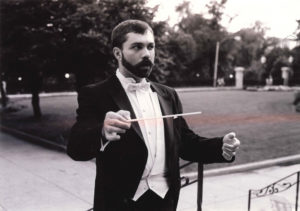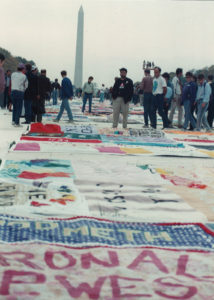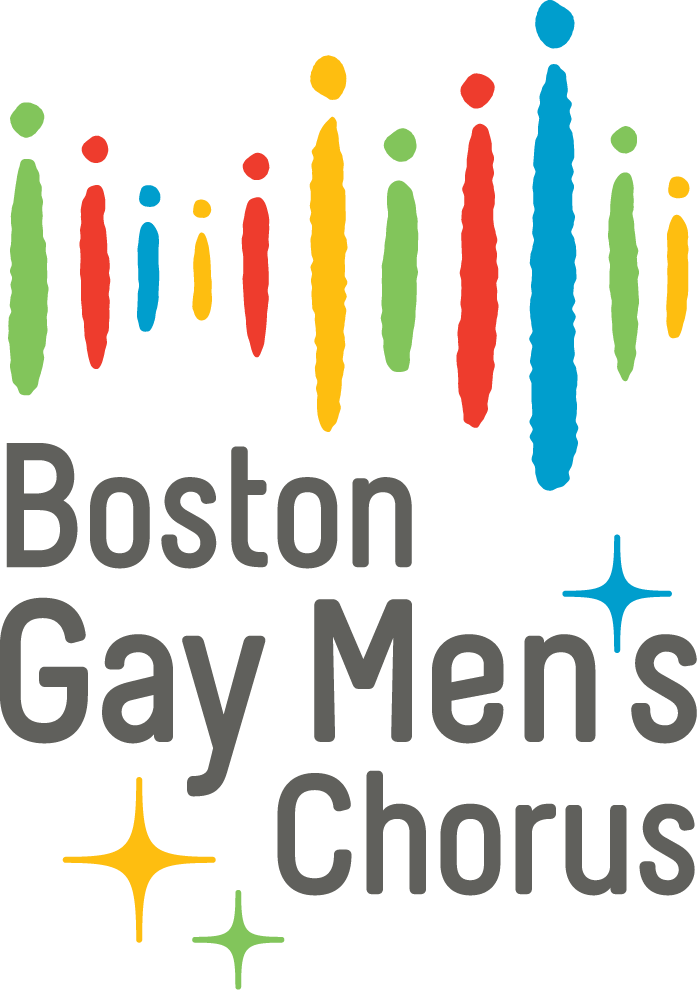
Robert Barney began his long tenure with the organization in the fall of 1985. As with any new leadership, his arrival brought a number of changes to the organization. One of the biggest saw a change in the repertoire. Many lighter pieces were performed, and fewer heavy, serious pieces. In the summer of 1986 the chorus participated in GALA (the LGBTQ choral association). This was a tremendously exciting event for members of the BGMC. They received resounding applause from the audience for their inaugural performance. They joined with 1,400 participants in a single chorus to perform excerpts from Randall Thompson’s Testament of Freedom. The chorus has participated in every GALA festival ever since.
In recognition of their growing presence in greater Boston, the Chorus was asked to perform as part of the anniversary choir to celebrate the tenth anniversary of the renovation of Faneuil Hall Marketplace. They performed under the direction of John Oliver from the Tanglewood Festival Chorus. This performance was another sign of the work the BGMC was doing to promote the growing cultural acceptance of LGBTQ people in the world.
That fall saw tragedy hit the chorus, the first death of a member. 36-yeard-old Richard Brummett auditioned and joined the chorus in September. He lived with his partner, medical doctor Peter Damian Barran, in the South End. On October 5th, only weeks after joining the chorus, Richard became a victim of domestic violence. Barran murdered Richard in a horrific manner. The incident was widely covered because he was the first doctor accused of homicide in Boston in more than a century. This incident highlights the fact that GLBTQ individuals are at high risk for domestic violence. Although Richard was deprived of the chance to perform with us, we remember him and honor his memory on our In Memoriam list. Once you join the chorus, you are family.
In December 1986, on the day after the annual holiday show, the chorus went to Faneuil Hall for an appearance at an event entitled Bridges. The event was a time of remembrance and renewal for people whose lives had been affected by AIDS. The chorus had been lucky so far. While individual members had been affected by the disease, the chorus was not yet impacted directly. That was about to change.
June 1987 saw the chorus celebrate its fifth anniversary with a concert at Jordan Hall. The program was a mixture of serious and lighthearted pieces. It began with I Am What I Am from La Cage Aux Folles, and ended with Barry Manilow’s One Voice. By this time the chorus had grown to seventy voices strong.
In the June 3, 1987, newsletter Eric Cossart-d’Espies wrote:
May 31 — Dear Boston Gay Men’s Chorus — Board & Members,
I entered the hospital on May 20 with fungal meningitis, one of the opportunistic infections associated with AIDS. I was originally diagnosed with AIDS last August.
Shortly after my arrival at Brigham & Women’s Hospital a beautiful bouquet of flowers arrived from the Chorus. Those flowers meant a great deal to me. Thank You.
My time as a chorus member was significant in my ‘coming out’ as a gay man and a great deal of fun. I continue to follow your concerts with great pride & solidarity.
Love, Eric Cossart-d’Espies.
John LaPorta followed this with an editorial:
With reception of this letter, we enter, if any of us hadn’t already, an era that Kelly of the San Francisco Gay Men’s Chorus (a former Boston member) predicted for us when we met in Minneapolis at GALA last year. ‘ I’ve buried seventeen friends who died of AIDS,’ he told me. ‘I hate to put it this way, but it is only a matter of time before the Boston Chorus will be dealing with the same thing. You’ll have to be very strong.’
So let each of us find the strength to express in his own clear voice the healing power of our music-making. Whatever that power may mean to each of us, it flourishes only in the context of our fellowship. This is what we have to offer as a group in the fight against AIDS.
It would not be long before we began to be tested. Just a few weeks later another notice appeared in the newsletter from John:
Goodbye, Joe Molloy
Bass Section Member of the Artistic Committee, who died at 7:09 pm July 6 at Beth Israel Hospital.
Whatever we believe about life and death, we remember Joe alive in the flesh, and few were ever more lively than he, that’s certain. It’s now our pleasure to sing. Joe was never one to leave irons off the fire. If you fell on your face he’d be the first to laugh and the first to help you up, not necessarily in that order. Sweet Little Buttercup was that kind of man, and he’d laugh that line right off the stage. As he was known to put it, “Can we Lightened up? now? please? sure we can.”
Joe joined the chorus in September 1985. He sang for two years, and was very active during them. Members of the chorus held a round-the-clock vigil by his bedside in the hospital for days until he passed. The Sunday after he died, the BGMC sang at his services at the Grace Congregational Unitarian Universalist Church in Framingham. We were not identified in the memorial program out of respect for the family’s wishes. This was just the start of a wave. Over the next decade the chorus would perform at countless memorial services for AIDS victims.

Across the country, organizations in 1987 were planning for the second major national gathering in Washington, D.C., for lesbian and gay rights. The BGMC got in touch with the Gay Men’s Chorus of Washington and volunteered to help coordinate participation of GALA choruses in the march. This was the first march to include participation by Act Up, and the first public display of the Names Project AIDS Quilt. Members of the BGMC travelled to D.C. to participate during the march in October.
In 1985 Joe Molloy’s partner Mark Wayne also joined the chorus, serving as assistant accompanist. In December 1987 he took on the role of directing the small ensemble. The following spring the group had an official name: The Bay Statesmen. This group sang a variety of cabaret style pieces. He continued as director for two seasons, through the Pride show in 1989. Sadly, Mark himself lost his own battle with AIDS in March 1992.
1988 saw the chorus perform joint concerts with the New York City Gay Men’s Chorus in Boston and New York. We had the honor of performing in Avery Fisher Hall at Lincoln Center in New York. In December that year the BGMC became the second recipient of the Harvey Milk Community Service Award from the Greater Boston Lesbian and Gay Political Alliance. The award was name for Harvey because of his staunch belief that “gay power” was a grassroots issue of pride. The BGMC was presented the award because of the sense of family, sense of community, and sense of brotherhood it fostered with the Greater Boston LGBTQ community, and its growing national reputation for promoting civil rights.
The chorus started the 1980s as a fledgling organization. It slowly but steadily grew in size, quality, and reputation. From the group of thirty individuals that Josef Bevins brought together in February 1982, nearly a hundred men formed the chorus at the end of the decade. The annual budget grew to the range of $100,000. Throughout the decade, it commissioned and premiered new works and arrangements to help tell our stories as gay men. Concerts were ASL interpreted. The chorus spent much of its time supporting the community in facing the AIDS crisis, and began facing our own losses to the disease. It ended the decade with tremendous respect in the general Greater Boston community as a high-quality musical organization.
